By: debbie lynn elias
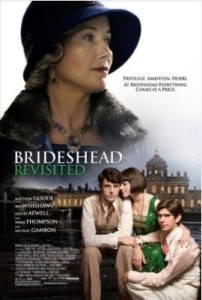
There are few that have made it through a formative high school education that are unfamiliar with Evelyn Waugh’s epic novel “Brideshead Revisited.” Written by Waugh in a span of four months while on leave from the Army late in WWII in 1944 and completed as the Allied forces were landing in Normandy, for many, “Brideshead Revisited” was the last bastion of the English Catholic aristocracy. Spanning three decades from the 1920’s through the 1940’s, Waugh’s words were lush, provocative, opulent and in many respects, autobiographical, mesmerizing us with the timeless story of the aristocratic Marchmain family and their beloved palatial Brideshead Castle, as told through remembrance by the once young, but always middle class, Charles Ryder. Now billeted at Brideshead late in WW II, Ryder looks back on his life and times with the Marchmains and a time when class and Catholicism clashed. Included in Time Magazine’s “Top 100 Novels”, “Brideshead Revisited” has become a classic since its publication in 1945. Making headlines back in 1981, BRIDESHEAD was adapted into an acclaimed landmark television mini-series but it is only now, with director Julian Jarrold at the helm and a stellar cast in play that Waugh’s work achieves its true splendor as BRIDESHEAD REVISITED comes to the silver screen in what is most certainly a guaranteed Best Picture nominee for Oscar gold.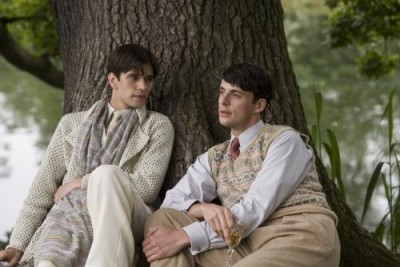
Charles Ryder is young, level-headed but at times albeit impetuous college student. Having lived a modest, middle-class life, Charles always felt as if he was on the outside looking in as he studied the aristocratic upper class from afar, always dreaming of a titled life, a gilded life, a privileged life. So you can only imagine Charles’ delight when befriended by the foppish yet delightful Sebastian Flyte, both heir to the Marchmain dynasty and the bane of his family’s existence. Eager to please his new “friend”, Sebastian brings Charles home to the family castle known only as “Brideshead.” And it is with enthusiastic yet tempered abandon that Charles embraces Sebastian’s privilege and wealth and on meeting the family, is desirous to become a part. Adding a little fly into the ointment, however, is the fact that Sebastian is smitten with Charles while Charles, despite some leading intentions towards Sebastian, is more than taken with Sebastian’s sister, Lady Julia Flyte. Unfortunately, Sebastian and Julia’s mother, family matriarch Lady Marchmain sees her children’s affections for Charles and Charles’ affections for Julia. Ruling her family with a manipulative iron fist by instilling good old Catholic guilt whenever and wherever possible, she determines to put an end to any potential relationship for any of them for you see, Lady Marchmain is a devout Catholic and Charles, as described by the good lady, is not only not of their class, but is an atheistic pagan.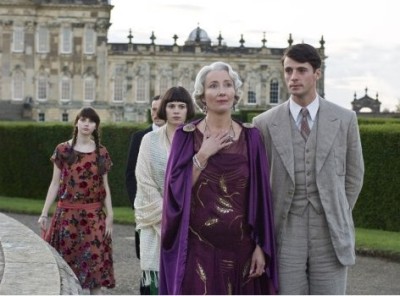
The Marchmains give new meaning to a dysfunctional family. As if circumscribed Catholic guilt isn’t enough, Sebastian looks for love in all the wrong places and always ends up turning to alcohol for solace and sympathy in his own patented brand of manipulation. Julia clearly has eyes for Charles and uses her feminine wiles at will, only to break his heart “because of religion.” Lord Marchmain, estranged from the family lives happily and guilt-free in Italy with his mistress who is a Catholic but who lives a free “sinful” lifestyle as “that’s why we have confession.”
As for Charles, it seems destined that he will always be touched by the Marchmains in some manner as he is embraced, rejected, embraced again. . .or will he. And is he content with always being on the outside looking in.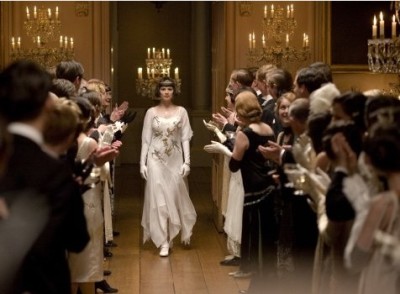
Matthew Goode tackles the daunting job of playing Charles Ryder, an observer, and everyman, the main man. Carrying the film in some 95% if not more of the scenes, Goode finally becomes the leading man I always knew he could and would be. You first heard me mention him some years back for his performance as undercover Secret Service agent, Ben Calder, in “Chasing Liberty.” Suave, sweet, sexy, he showed us he has the looks and the chops to draw the female audience. Then along came another signature role, that of bank robber and con artist, Gary Spargo, in Scott Frank’s thrilling “The Lookout”. And now, with what is becoming his patented style of characters with an edgy authoritative air with an essential goodness that can easily go bad, Goode walks that tightrope bringing us a rich, full-bodied character study as Charles Ryder. “I knew the novel. I read it first when I was about 12. I had the seen the series previously about 5 years before. Charles’ voice is so prominent because he is the narrator of the story. It felt like you had to convey a huge amount more.” Initially uncertain about the role as “I just don’t get him” it didn’t take long for Goode to realize he was meant for the role. Charles is “such a lonely character and once you peal back the psychology of this guy who just didn’t know where he was supposed to be in life; without a mother and his thoughts on religion. . .it’s just such a dense project. And as much as it’s been done before, I think this was just such a great opportunity.” And of course, “the opportunity to work with Emma Thompson far outrides any [hesitation].” Goode carries the film with an authoritative heartfelt sensitivity that begs for the story to continue simply because he has made you part of the film; made you feel as Charles does on the outside looking in and always wanting more. A performance that is classy and classic.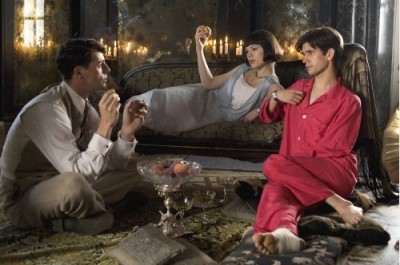
The often underrated but never understated Ben Wishaw embodies the role of Sebastian much as he did that of Bob Dylan in the incredible biopic “I’m Not There.” Wishaw mesmerizes you as he fills the screen with an undeniable presence. As Sebastian, he is a delight and never misses a beat as his character takes a 180 degree physical metamorphosis while retaining his elan and flair for life.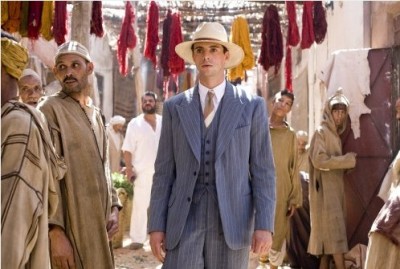
After her performance here as Julia, never again will Hayley Atwell only be remembered for her Alex Winter-directed Pringles commercial as she is quite simply lovely and luminous. Her face fills the screen with porcelain beauty and as Atwell herself noted, a good portion of the costuming was made for a body like hers; particularly the fashions of the 40’s that accentuated bustlines and curves. Atwell also walks a fine line balancing that little angel and devil on her shoulders, playing to Julia’s wants, needs and ultimately, Catholic guilt. A stunning performance.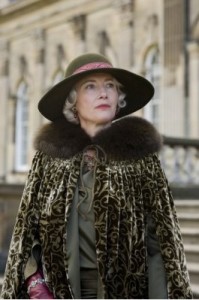
Clearly Emma Thompson and Michael Gambone brought some Hogwart’s magic to the production as Lady and Lord Marchmain. Thompson, elegant and proper to the point of regal, she commands a scene as Lady Marchmain commands her family. She is breathtaking to watch. Gambone on the other hand, is joyously free and unbridled in his enthusiastic take on Lord Marchmain. Physically expressive, his face speaks volumes.
Screenwriters Andrew Davies and Jeremy Brock do an exemplary job of adapting Waugh’s novel, as is ratified by the praises lauded upon them by the cast. Taking liberty with the novel, Davies and Brock took a different tone with the film, concentrating on the relationship between Julia and Charles, bringing issues of Sebastian’s homosexuality from the Roman Catholic familial slant more to the forefront, yet never underplaying the thematic crux of the story – societal ranking, religion and family. As Matthew Goode told me, “As the book is, her [Julia’s]character doesn’t really enter the fray until Book 2, Chapter 2.” But here, “by bringing her further forward and suddenly having this love triangle thing going on, does that make Charles look more ambitious than he actually was at that period in his life. That was initially a concern, but I think it made it really super interesting.”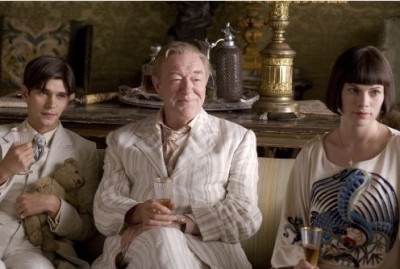
Meticulous almost to a fault, director Julian Jarrold’s attention to detail in every aspect of this film is mind-boggling. So intent was he on capturing not only the emotion, but the splendor of Waugh’s novel and the ultimate script, nothing was overlooked, starting with the use of Castle Howard in North Yorkshire, England as Brideshead. If it looks familiar to you, it should as Castle Howard was also used in the tv mini-series. Not only were multiple locations used throughout Great Britain, but the cast and crew also travelled to Venice and Marrakesh for some of the films pivotal scenes. This film would be nowhere near as beauteous were it not for the sumptuous cinematography of Jess Hall. Concentrating on two distinct color palettes, each visually conveys the emotion of the time. In 1925, a romantic warmth is created mirroring Charles’ romanticism of Brideshead while in 1935, colors and tones change to a colder cool look. And because of these dinstinct looks, lighting was crucial and given the very nature of shooing much ni Castle Howard as complicated “as lighting a cathedral.” (A bit of trivia for you, director David Yates was originally set to direct, but had to step aside to direct another little film called “Harry Potter and the Order of the Phoenix” thus making way for Jarrold’s incredible vision.)
Costuming was impeccably researched and executed by Eimer Ni Mhaoldomhnaigh, an old hand at period pieces having been costume designer on “Becoming Jane.” Sadly, according to Hayley Atwell, the luxurious and opulent estate jewelry pieces worn by herself and Emma Thompson are not real, but rather faux gems. Likewise, Roseann Smauel’s hair and make-up artistry was an artistic challenge given the 30 year time spance that covered perhaps some of the most influential eras in hair, make-up and fashion. The icing on the cake is the orchestral score performed by the BBC Philharmonic under the direction of Terry Davies.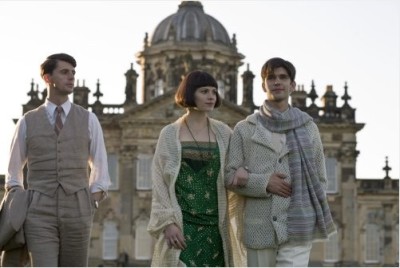
It is rare when you have ever heard me regale a film based on a book. Few live up to the literary imagery created by the author or even the actual story content for that matter. With BRIDESHEAD REVISITED, the story, the characters, the visuals, are just as I envisioned when I first read Waugh’s masterful words so many years ago (and re-read before screening the film). By no means is the audience cheated or deprived of excellence with this film. Let the Oscar race begin. Sweeping, epic, sumptuous, period perfect, decadent, religious, familial. BRIDESHEAD REVISITED is the Best Picture to beat this year!
Matthew Goode – Charles Ryder ebn Wishaw – Sebastian Flyte Hayley Atwell – Julia Flyte Lady Marchmain – Emma Thompson Lord Marchmain – Michael Gambone
Directed by Julian Jarrold. Written by Andrew Davies and Jeremy Brock based on the novel by Evelyn Waugh. Rated PG-13. (135 min)












